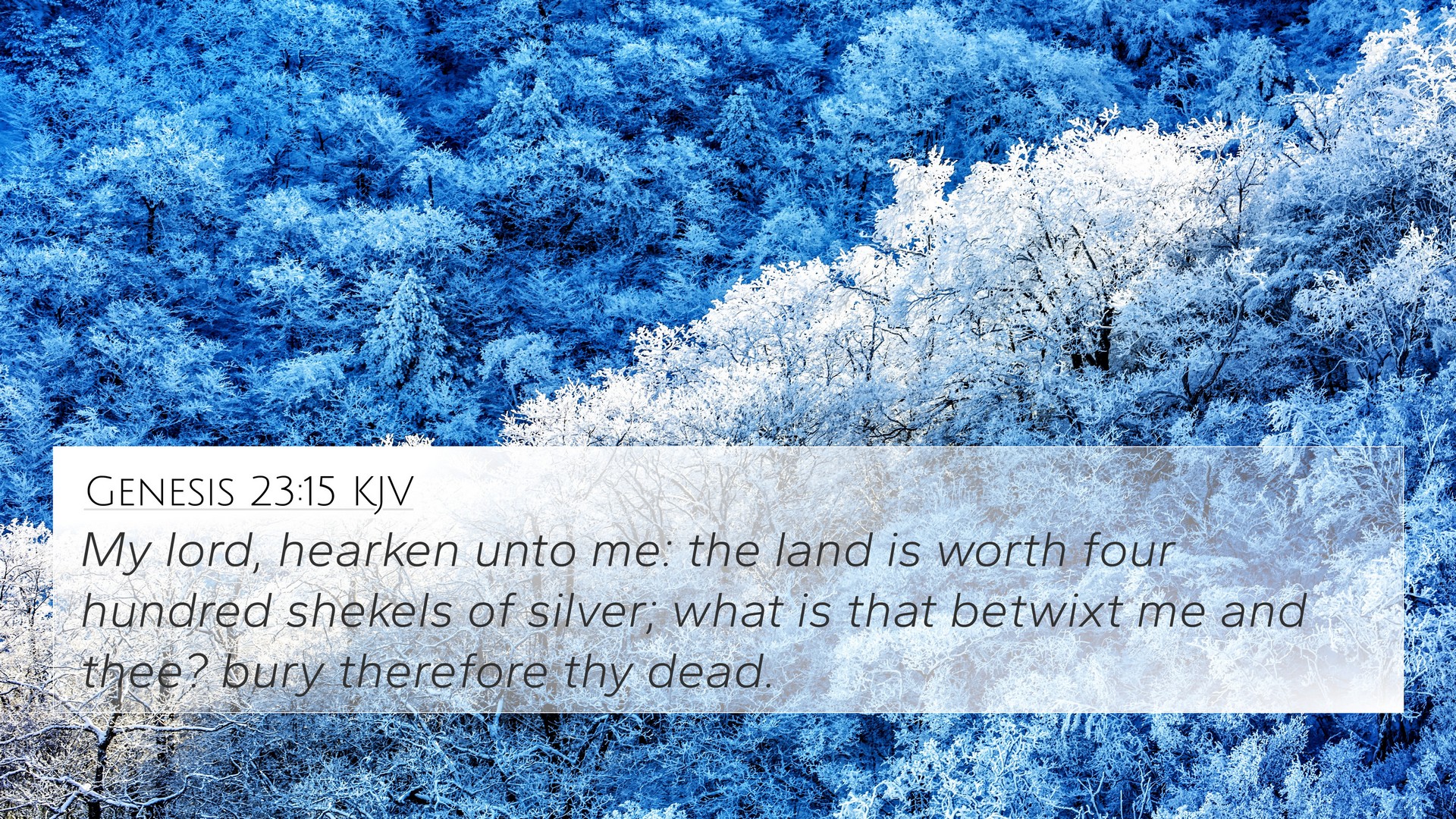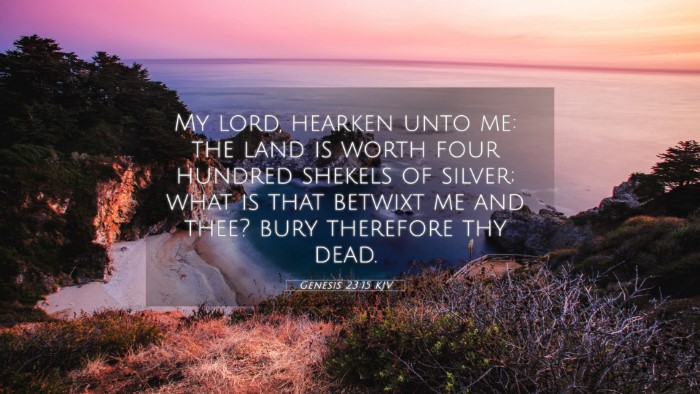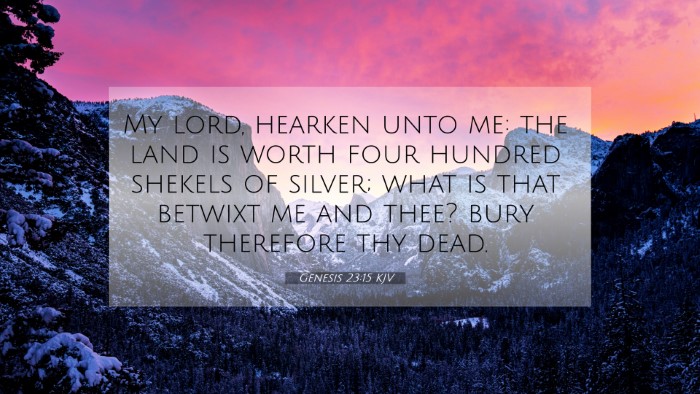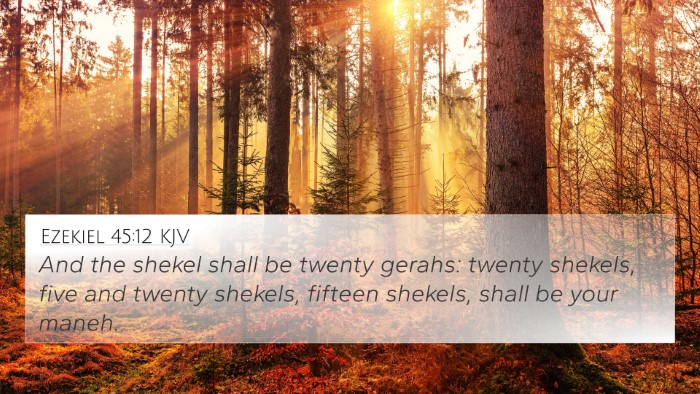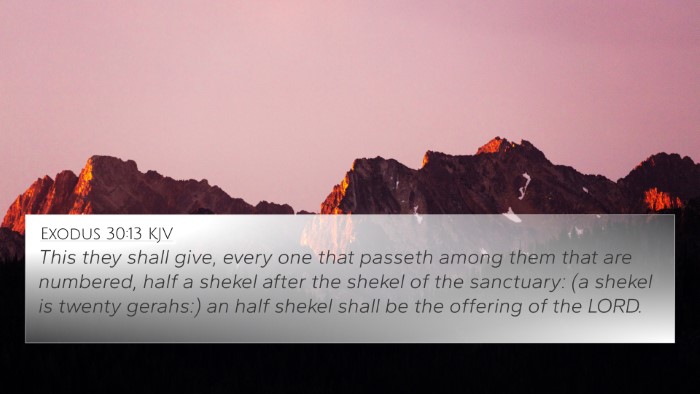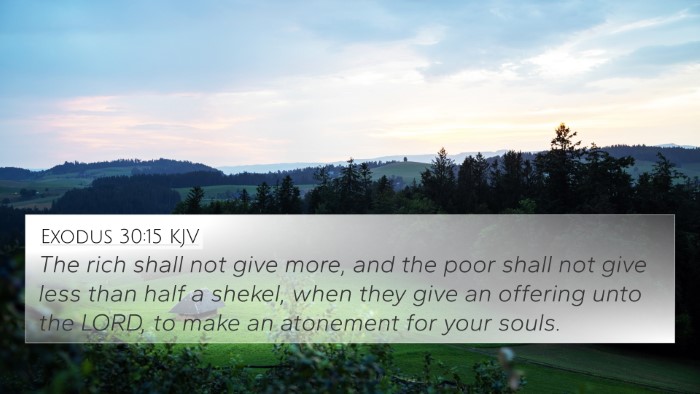Genesis 23:15 Overview
In Genesis 23:15, Abraham seeks to purchase a burial site for Sarah, his wife, from the Hittites, demonstrating his respect for her and his desire to establish a rightful place of mourning and remembrance. This act is significant not only for its immediate context but also for its implications regarding property, heritage, and God's promises to Abraham regarding the land.
Verse Text
"My lord, hear me. The land is worth four hundred shekels of silver; what is that between you and me? Bury your dead." (Genesis 23:15, ESV)
Interpretation and Meaning
This verse highlights Abraham's negotiation with Ephron the Hittite over the price of a burial plot in the land of Canaan, marking one of the first recorded instances of land acquisition by the patriarch, which is significant in the larger narrative of God's promise to Abraham concerning the land.
- Respect and Recognition: Abraham addresses Ephron with courtesy, demonstrating the respect necessary in inter-cultural negotiations. His request for a burial site is treated with the gravity it deserves, showing the importance of burial customs in ancient times.
- The Value of Land: Ephron's mention of 400 shekels demonstrates the cultural practice of valuing land and the challenge of ownership in a foreign land. This highlights the financial implications of Abraham's faith and his legacy.
- Covenantal Promises: The acquisition of this burial site is not just practical; it is also theological. It signifies Abraham's belief in God's promise that his descendants would inherit this land.
- Legacy and Faith: By purchasing land for Sarah, Abraham acts in faith, believing in the promises regarding the land of Canaan, thus establishing a presence for his family in the Promised Land.
Cross-References
- Genesis 15:18-21: Highlights God's promise of land to Abraham's descendants, establishing a foundation for Abraham's negotiations for land in Canaan.
- Genesis 24:3-4: Further demonstrates Abraham's understanding of land ownership and his desire for his descendants to remain in Canaan.
- Genesis 17:8: Reinforces the promise of land to Abraham and his offspring, underpinning the importance of acquiring a burial site in the promised territory.
- Hebrews 11:9-10: Discusses Abraham's faith in living as a foreigner in the land of Canaan, suggesting a deeper spiritual dimension to land ownership.
- Acts 7:5: References the promise made to Abraham about inheriting land that he could not possess in his lifetime, linking the Old Testament promise to the New Testament understanding of inheritance.
- Job 1:21: Talks about death and the importance of burial practices, similar to Abraham's view on honoring the dead.
- Psalm 49:16-17: Reflects on the eternal nature of one's legacy versus material wealth - pertinent to Abraham's act of securing a burial site for Sarah.
Connections Between Bible Verses
This verse in Genesis serves as a pivotal point that can be analyzed for its inter-biblical dialogue, linking themes of faith, land, legacy, and custom across various parts of scripture. For instance, the way Abraham negotiates for land reflects broader theological themes that run throughout the Bible regarding inheritance and belonging:
- Connections to Old Testament Themes: The act of purchasing land establishes a link to future Israelite customs regarding land ownership, as seen in the laws given in Leviticus (Leviticus 25:10-34) regarding the sale and redemption of land.
- Relations to New Testament Teachings: Jesus’ parables about treasure in heaven (Matthew 6:19-21) draw a connection to the faith that Abraham exhibits in acquiring a seemingly earthly possession as part of a heavenly inheritance.
- Inter-Biblical Dialogue: The land of Canaan later becomes the central focus for the Israelites, tying back to Abraham’s actions, illustrating the progressive revelation of God’s promises throughout scripture.
Thematic Bible Verse Connections
The themes of burial, respect for the dead, and rightful ownership of land resonate throughout the Bible, often connecting back to Genesis 23. In addition to practical lessons, such themes enhance our understanding of God's promises and human behavior, creating a rich tapestry for comparative Bible verse analysis.
- The Importance of Burial Practices: Links to Ecclesiastes 3:20, where it mentions the return of man to dust, underscoring the mortal nature that Abraham acknowledges through his actions.
- Covenantal Themes: Genesis 17:19 reinforces God's eternal covenant with Abraham and his descendants, which is echoed in the significance of Abraham's acquisition.
- Faith and Legacy: Romans 4:3 reflects on Abraham's faith being counted as righteousness, echoing the foundational role that trusting in God plays in the story of redemption.
Conclusion
Genesis 23:15 serves not just as a historical account within the Genesis narrative but as a rich focal point for understanding larger themes of land, inheritance, and faith that permeate the scriptures. By examining this verse alongside its cross-references and thematic connections, one can appreciate the intricate relationship between the Old and New Testaments, as well as the continuous dialogue that runs throughout the biblical narrative.
Tools for Bible Cross-Referencing
To study Genesis 23:15 and its connections more deeply, consider utilizing:
- Bible concordances to find specific references to land and burial practices.
- Bible cross-reference guides to explore related themes across scripture.
- Cross-reference systems available in many study Bibles.
- Cross-referencing Bible study methods to enhance understanding of Abraham’s faith and actions.
In summary, the interplay of these themes through the lens of Genesis 23:15 invites deeper reflection on how we interpret connections in scripture and apply them to our understanding of faith, legacy, and the promises of God.
